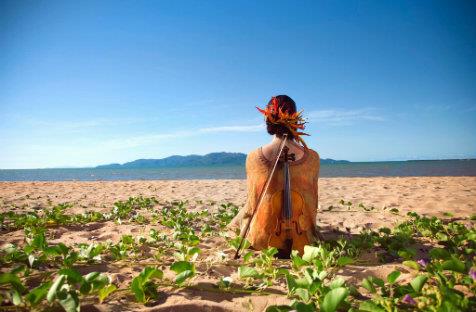A sea eagle flew across the sky at Radical Bay, Magnetic Island, dangling a protesting green snake from its talons as David Malouf read from Ovid and his novel An Imaginary Life. The readings were interspersed with a beautiful account of Benjamin Britten’s Six Metamorphoses by oboist Nicholas Daniel.
Throughout this concert-cum-picnic on the beach, in which the accordion player Ksenjia Sidorova performed Zubitsky’s Homage To Piazolla and The Brass Quintet were superb in Crespo’s Suite Americana No. 1, bronze-winged brahmini kites circled above the panorama of massive granite boulders and towering hoop pines. This afternoon was an example of superior cultural tourism.
Mostly, the Australian Festival of Chamber Music’s concerts took place at the Townsville Civic Centre or in St Joseph’s and St Patrick’s Churches. New sound worlds, as represented by early music practitioners and an accordion, brass and harp were introduced in this year’s event, which celebrated the anniversaries of Benjamin Britten, Poulenc, Verdi and Wagner. One of the highlights was the Goldner Quartet’s performance of Verdi’s String Quartet.
The early music component was a welcome addition but perhaps programming it for the dry acoustic of the Townsville Civic Centre wasn’t such a great idea. This repertoire would be better suited to a church.
There was a strong representation of singers. At the Opening Night Concert, A Masked Ball, Tobias Cole (countertenor) and Marshall McGuire (harp) gave a moving, heart-on-the-sleeve account of John Dowland’s In Darkness Let Me Come. Lyrical tenor Markus Shafer is a gifted storyteller and his animated rendering of Beethoven’s little known Scottish Songs including ‘Sally in Our Alley’ was a big hit. Rosamund Illing’s Leibestod (Tristan und Isolde, Wagner), arranged for 15 players by James Ledger, this year’s composer-in-residence, will linger in the memory and was rewarded by a standing ovation.
Standout concerts included It Ain’t Necessarily So, a collaboration between stunning violinist Zoe Black and virtuosic crossover pianist Joe Chindamo, who demonstrated how other people’s music can be reimagined and reharmonised. The approach was as refreshing as the gusty wind that blew across the crowd and pummeled the marquee’s roof in Jupiter Hotel’s manicured garden. Chindamo’s revamp of Dido’s Lament was particularly persuasive.
Another wonderful concert was Zuill Bailey’s performance of the Six Cello Suites. Through Bailey’s fingers, the Suites became powerful oratory; pleading, argumentative, heartbroken, thoughtful, enraged. The infinitely varied phrases paused, stopped and sighed in Bailey’s astonishing, spontaneous interpretation.
Including Benjamin Britten’s community opera Noye’s Fludde in this year’s program, which calls for a raft of local instrumentalists, dancers and singers to perform alongside the Festival’s professional musicians, was an inspired idea. It was also brave, because there was much to coordinate in only two rehearsals. The performance despite the odd frayed hem was a charmer. David Hibbard’s Noah was convincing.
The UK pianist Andrew West who runs the Nuremberg International Festival was bowled over by the trusting and cultivated audience who are so receptive to new, neglected and rarely heard works.
To end on a critical note, but for the Ray Golding Series, the concerts are too long. The extensive numbers of works on the Evening Series programs creates intolerable pressure for the Artistic Director Piers Lane’s good-natured but seriously perfectionist instrumentalists.
Australian Festival of Chamber Music
Townsville
26 July – 3 August





